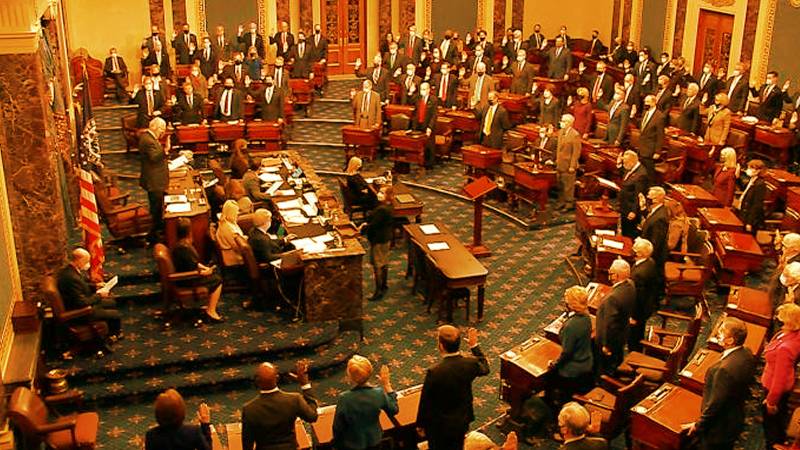
The United States Senate has disclosed the long-awaited text of a bipartisan agreement to impose tougher immigration and asylum laws.
As the disclosure was made, US Vice President Kamala Harris said: "The immigration system has been broken for decades. That’s why President Biden and I spent the last three years putting forward solutions to fix it and address the root causes of migration."
In a statement, she said the $118 billion package is the result of months of negotiations between the Republicans and the Democrats in the US Senate, as well as the Biden administration. However, it is unclear whether the it will pass Congress, she added.
CNBC News said that "this agreement — reached by Senators James Lankford, Chris Murphy, and Kyrsten Sinema — would be the most aggressive border security and migration overhaul bill in decades if it passes Congress. It would raise the standard to get asylum, send away those who don't qualify, and expedite cases for those who do."
Should the bill pass, it would bring an unusual shift in US immigration policy.
It is pertinent to mention here that in 1986, the US Congress had enacted the Immigration Reform and Control Act, which granted legal status to millions of unauthorised immigrants, mainly from Latin America, provided they met certain conditions. The law, though, also imposed sanctions on employers who hired unauthorised immigrants. Subsequent laws in 1996, 2002, and 2006 responded to specific concerns about terrorism and unauthorised immigration. These measures emphasised border control, prioritised enforcement of laws on hiring immigrants, and tightening the admissions eligibility.
Tough fight expected
The US Senate is split very closely between Democrats — who have a majority with 51 seats — versus the Republicans — who have 49 seats.
If Democrats reject the bill in the Senate, then there will be another tough vote in the US Congress where 213 Democrats will have to face off against 221 Republicans.
The Democrats are hopeful the bill will sail through as it carries legislation on providing support for Ukrain, Israel and the Indo-Pacific region in a package worth $118 billion. US President Joe Biden's national security legislation also includes funding for humanitarian aid.
The politically perilous path ahead for the bill saw its its first hurdle when, even before seeing its contents, lawmakers on both the right and, to a lesser extent, the left flanks of Congress, have slammed the measure. House Speaker Mike Johnson called it “dead on arrival” in the chamber. Former US president Donald Trump, who has made the border a core campaign issue, has also opposed the deal.
Key changes
According to CNN, the key changes included in the bill:
New emergency authority to restrict border crossings if daily average migrant encounters reach 4,000 over a one-week span. If that metric is reached, the Homeland Security secretary could decide to largely bar migrants from seeking asylum if they crossed the border unlawfully.
If migrant crossings rise past 5,000 on average per day in a given week, DHS is required to use the authority. If encounters reach 8,500 in one day, the department is required to trigger the authority. But the federal government has been limited in how long it can use the authority.
In the first year, the government can use it for 270 days, then 225 calendar days in the second year, and 180 days in the third year. The authority sunsets after three years.
It codifies a policy that requires the government to process at least 1,400 asylum applications at ports of entry when the emergency authority is triggered.
Raises the legal standard of proof to pass the initial screening for asylum, making it potentially more difficult for asylum seekers to pass.
Extends the asylum processing timeline from years to six months.
Introduces a new process in which US Citizenship and Immigration Services would decide an asylum claim without it going through the immigration court system. The process doesn’t apply to unaccompanied migrant children.
Preserves the president’s authority to designate humanitarian parole on a case-by-case basis. President Joe Biden has used the authority for Ukrainians, Afghans, Cubans, Venezuelans, and Haitians, among other populations.
Includes limited changes that narrow the use of parole at land borders.
Authorises 250,000 additional immigrant visas to spread out over five years for families and applies to employment-based immigrants.
Provides a pathway to citizenship for Afghans paroled into the United States after the US withdrawal from Afghanistan and extends the special immigrant visa programme for Afghans who worked for the US government.
It is worth mentioning that, in the recent past, changes in the immigration policy have been an exception to that pattern.
In 2012, then-President Obama took executive action to allow young adults who had been brought to the country illegally to apply for deportation relief and a work permit. In 2014, he expanded that program (known as Deferred Action for Childhood Arrivals, or DACA) and set up a new program to offer similar benefits to some unauthorized-immigrant parents of US-born children.
The DACA expansion and the new program (Deferred Action for Parents of Americans and Lawful Permanent Residents, or DAPA) are on hold because of a legal challenge by 26 states.

